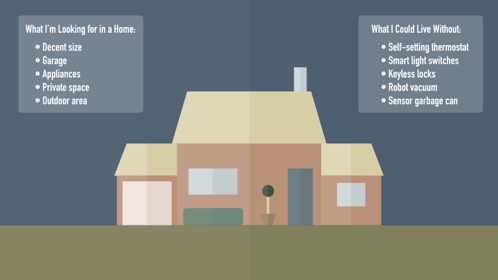Millennials represent a demographic that has become synonymous with technology. They are said to have a dependence on social media, and a “when we want it, we want it now” mindset. These stereotypes are purported in media coverage, have popped up in political discussions, and have trickled their way into the housing market.
Why, you ask? Millennials are now the largest living population and the next iteration of home buyers. As a member of the Oregon Trail generation, I don’t really fit neatly into either generation. This became clear when I was excitedly talking about the new version of Amazon Echo and how I could link it with my smart light bulbs, garage door, and security system. I tried to share my enthusiasm with a millennial team member, only to find her rather indifferent to the new device:
“I can’t see why I would ever want to do any of that. Is pushing a button or flicking a light switch that hard?”
After telling that whippersnapper to “get off my lawn,” I sat down with her to talk about her thoughts on smart homes to see if maybe my stereotypes of millennials weren’t entirely accurate. Weren’t they the ones who wanted the latest technology?
Steve: Ashley, clearly you just don’t understand the potential that these smart devices have on changing the way our homes operate.
Ashley: Oh, I understand it. It’s just not something I need. While these innovations are impressive, and often beneficial, it’s hard to fathom millennials, many of whom are first-time home buyers, would allow these luxuries to outweigh other priorities.
Steve: That’s probably just because you’re a renter. Once you buy a home, you’ll want all of this smart technology.
Ashley: My boyfriend and I have been talking seriously about purchasing a home because we’ve put all of this money into renting an apartment, why not make an investment instead? He’s 29 and I’m 24. He’s a tech enthusiast and I’m not. But, despite him being a “techie,” our discussions regarding homeownership are never centered on a self-setting thermostat, a device that welcomes us when we walk through the door, or whether our lights will turn on and off by themselves. We discuss size, locality, appliances, and having a garage so we don’t have to park our cars on the street. Maybe down the road these will make the priority list, but for our first home we don’t need smart, we need simple, suitable, and affordable.
Steve: What’s driving this sensible, realistic mindset?
Ashley: Most millennials are making under $40,000 per year. With competitive job markets, surmounting student loan debt, car payments, and the cost of living, millennials are finding it much more difficult to purchase homes than our Gen X predecessors did at this age. With limited budgets, we’re just hoping we can find the right home at the right price and the right sellers who will accept our bid. And yet, the common belief is somehow that a home’s inclusion of smart technology is at the top of our mind.
Steve: So it’s a budget thing then?
Ashley: Yes and no. In a survey of 1,000 millennials, Northshore Fireplace gave the group a hypothetical $300,000 budget to choose from 38 property upgrades to achieve the home of their dreams. The top three ways millennials chose to spend the budget? Three-quarters selected new appliances, 64% chose having a large master bedroom, and 54% picked a two-car garage.
In the technology category specifically, “new appliances” were chosen more than any other upgrade, with solar panels and energy storage garnering 47% of millennials’ interest, and smart home systems acquiring only 38%. The takeaway here? Millennials may not be as inclined to seek out smart homes after all. Rather, we’re considering the necessities every potential home buyer looks for like updated equipment, overall comfort, and enough space.
Steve: So what’s driving the smart home market?
Ashley: Gen Xers! According to a CEPro study done last year, the smart home adoption rate is “almost double for Gen X than for millennials” and the main reason is because they have more money to spend. The reality is that Gen Xers think smart tech provides home security and energy savings, two things you place a high priority on. Millennials think of it as something cool and convenient—two things that don’t rise to the top of our list when buying a home.
My biggest takeaway from this conversation? Builders should absolutely be incorporating smart home technology into new homes, but don’t do it in an effort to attract millennials. That’s not where their priorities lie…yet.
This story appears as it was originally published on our sister site, www.hiveforhousing.com.



